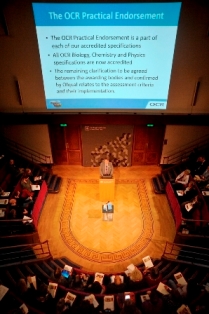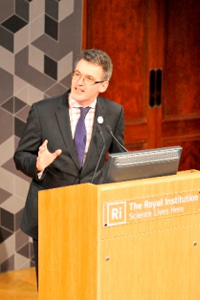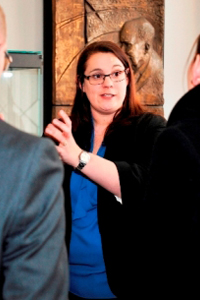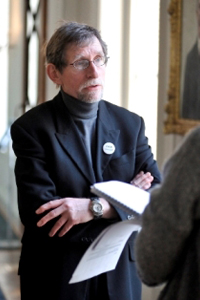OCR is Positive About Practical
24 January 2015
On 6 February 2015, OCR launched its distinctive approach to science practicals at the Royal Institution in London. The issue of practical assessment in science is something OCR has long campaigned about – including commissioning research on the subject in 2013.




L-R: Neal Wade, one of OCR's Science Subject Specialists, presenting on OCR's Practical Endorsement; Mark Dawe, Chief Executive of OCR; Rachael Tomkins, one of OCR's Science Subject Specialists; Tim Oates, Director of Assessment Research and Development for Cambridge Assessment.
The launch came hard on the heels of a joint trial of the new approach by four exam boards. A Level teachers and students from 22 schools and colleges around the country who took part in the cross-board trial responded enthusiastically. A video of trial feedback is now available at www.ocr.org.uk/PositiveAboutPractical.
Trial participant Sarah Baldwin, A Level Chemistry Co-ordinator at Truro FE College, said: "This new practical portfolio really opens up science. Students will get more skills as it offers far more flexibility and breadth… It allows for more in-depth tasks and for much more research and discussion. It will therefore be far more useful for industry and HE."
OCR's new approach on practicals for A Level sciences integrates feedback from teachers and academics on its own science forums, independent research commissioned by OCR, as well as the results of the new cross-board trial.
OCR believes the new approach will improve the current system in several ways: increase the amount of practical work undertaken by students (a minimum of 12 experiments per subject will be assessed, whereas that can be as low as four per subject currently); change from artificial 'controlled assessments' to assessment over a full two year course; make achievement (a Pass or Fail) visible for the first time; and engender a deeper understanding of science through greater experimentation and allowing students to learn from their mistakes.
Dr Steve Evans, Head of GQ Reform at OCR and responsible for the development of OCR's new science qualifications, commented: "Teachers can now make a judgement about practical work carried out over two years and, as we have seen in the latest trial, students will also learn to be self-critical learners and play a role in assessing their own work. This compares favourably with current controlled assessments where it can be about luck on the day."
He continued: "It's making experiments truly experimental again. Learning from mistakes is a key path to knowledge. As Albert Einstein asserted, 'a person who never made a mistake never tried anything new'."
From September 2015 – and as tested on the trial – students will keep a personal notebook allowing teachers to see the thought processes of individuals and aid students in their revision for questions about practical work which will make up 15% of the end of course examinations. This notebook will be of use for admitting prospective students to HE courses.
As well as listening to feedback from members of its own science forum, OCR commissioned a report from parent organisation, Cambridge Assessment, authored by Tim Oates, Group Director of Assessment Research and Development, and published in July 2013. Oates will be addressing OCR's 'Positive About Practical' event on 6 February.
The report called for an end to the practice of coursework marks contributing to final results as it puts a strain on teachers, pupils and parents, does not assess what it set out to assess and encourages superficial learning. "For many years we have been stuck in a quagmire of coursework so that it now counts for as much as 33% of the marks for some science A Levels," Oates commented. "It is widely recognised that the current system of coursework assessment does not work."
Robin Millar, Emeritus Professor of Science Education at the University of York, concurs: "It is widely agreed by teachers and others that the current way of assessing competence in practical science is unsatisfactory. It gives an unreliable measure of students' capabilities, and can lead to much teaching time being spent on activities of very limited educational value. It is a real challenge to design a better approach in the current context of performance measures that are high-stakes for schools and teachers. Many teachers that I speak to think the new approach can lead to more, and better, practical work being carried out during the A Level course. Students will gain direct experience of a range of equipment and methods that give them a better understanding of how observation and measurement are used in the sciences to develop and support explanations, and build up their confidence in working in a laboratory environment."
The launch event on 6 February highlighted the distinctiveness of OCR's approach designed to offer choice, integration with teaching and progression: visit www.ocr.org.uk/PositiveAboutPractical. To contact the science team, email positiveaboutpractical@ocr.org.uk.